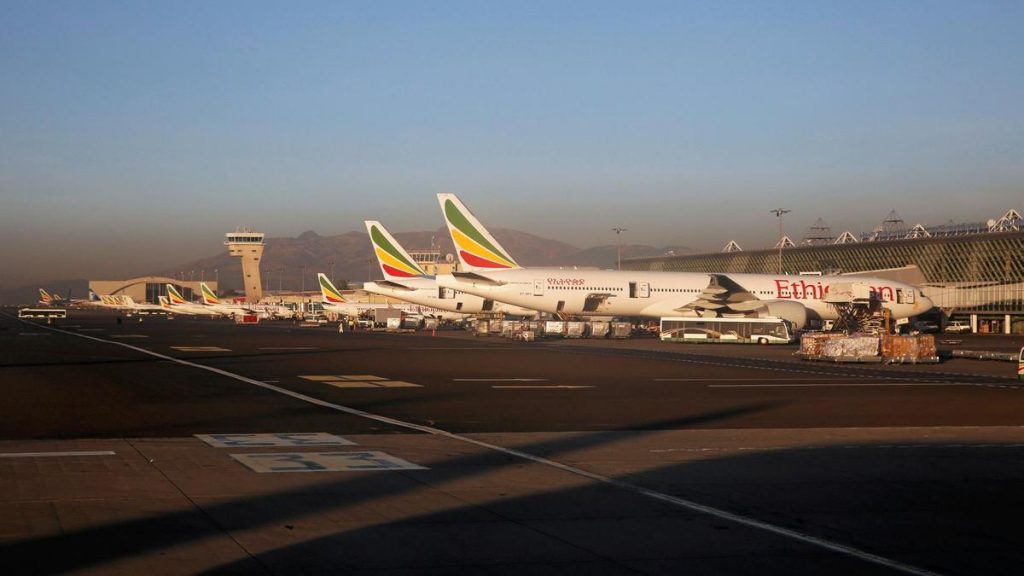Hassan Jaber, a businessman based in Gabon, was pulled aside at Addis Ababa airport

A Lebanese businessman has been released seven days after he disappeared at Addis Ababa airport as he was about to board a flight to his native country, a Lebanese MP told The National.
While Lebanese media were quick to blame Israel for Hassan Jaber’s disappearance, politicians have refrained from making accusations.
Mr Jaber, who has been based in the Gabonese capital of Libreville for decades, has dual citizenship and was travelling on his Gabonese passport at the time of his disappearance on September 8.
On Saturday evening, Mr Jaber’s elder brother, who also lives in Libreville, informed their extended family in Nabatieh, south Lebanon, that Gabonese authorities had helped secure his release, said MP Yassine Jaber, who represents Nabatieh and is not directly related to the businessman.
Mr Jaber boarded a plane back to Libreville on Sunday morning, accompanied by the Gabonese ambassador to Ethiopia, and was expected to make a statement to the press later in the day, said the Nabatieh MP.
Gabon was more involved in the case than Lebanon, which does not have a resident ambassador in Ethiopia.
It remains unclear as to who was holding the businessman.
His disappearance was made public by two relatives he was travelling with from Gabon to Lebanon via Ethiopia, a major transit hub in Africa which hosts a sizeable Lebanese expatriate community.
The three men were returning to Lebanon for the Shiite holy day of Ashura, the Nabatieh MP said.
“Hassan Jaber was asked to step aside after he showed his plane ticket to board a bus to the plane. His relatives lost sight of him after they got on the bus. There was an information blackout about him until last night.”
The Lebanese Foreign Affairs Ministry accused Ethiopian authorities of being unco-operative and on Friday gave the Ethiopian consulate in Beirut an ultimatum to reveal Mr Jaber’s whereabouts by Monday.
Beirut threatened to retaliate by urging its citizens to avoid flying Ethiopian Airlines if Addis Ababa failed to meet the deadline, the politician said.
Dozens of people took part in sit-in protest on Saturday over the businessman’s disappearance.
A Lebanese newspaper, Al Akhbar, reported that Mr Jaber’s family believed that Israeli intelligence was behind his abduction.
The newspaper said Mr Jaber’s story resembled that “of other Lebanese businessmen in Africa, France, the UAE, Saudi Arabia or South America, who suddenly find themselves behind bars”.
“The ready-made accusations are often ‘dealing with Hezbollah’. They are hunted down in third countries for the interest of the US or Israel,” said Al Akhbar, which is sympathetic to Hezbollah, the Lebanese party that is Israel’s arch enemy and classified as a terrorist organisation by the US.
Several Lebanese businessmen have been arrested across the world in recent years as the US attempts to squeeze Hezbollah’s finances.
The US accuses Hezbollah, which is backed by Iran, of money laundering and drug trafficking.
Last week, a US court sentenced Kassem Tajideen, a Belgian-Lebanese businessman arrested in Morocco, to five years in prison and fined him $50 million (Dh183.6m) . Tajideen was accused of being a top Hezbollah financier.
Earlier this year, a UAE court jailed six Lebanese men, four of them for life, for setting up a terrorist cell with links to Hezbollah.
Most Gulf states, including the UAE and Saudi Arabia, designated Hezbollah as a terrorist organisation in 2016.
However, there are no known charges against Mr Jaber.
“According to people who know Hassan Jaber very well, he is not a member [of Hezbollah],” Mr Jaber, the Nabatieh politician, said.
“One must differentiate between [active] members and general supporters of the resistance.”
Hezbollah built its popularity in south Lebanon by fighting Israel, which withdrew from the country in 2000 after 22 years of occupation.
source: The National


